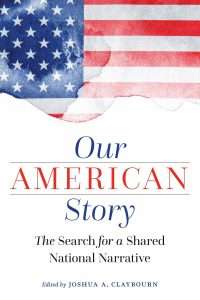The Volokh Conspiracy
Mostly law professors | Sometimes contrarian | Often libertarian | Always independent
An American Community
The Eighth post in the Volokh Conspiracy symposium on "Our American Story: The Search for a Shared National Narrative" (ed. by Joshua Claybourn).

Creating stable, durable polities out of diverse societies is a complicated task. The challenge is intensified if the political community intends to have citizens govern themselves rather than be subjected to a Leviathan-like sovereign. After all, the very concept of democracy presupposes the existence of a "demos" (δῆμος)—not a random collection of individuals who happen to share geographic space but, in keeping with the Greek root word "deo" (to tie or bind together) but people bound together by shared laws, customs or values.
The United States is not immune from sociological or historical laws, and American exceptionalism is no guarantee that the American experiment will succeed. In recent years, the ways in which the United States has sought to make many into one and to manage its extraordinary pluralism manifested among its citizens has been criticized both on the grounds of justice and of efficacy. At this moment when there are discussions on how to rejuvenate or create anew a sense of shared American identity, it might be useful to consider how other diverse societies approach the question of creating a common identity. Are there lessons to be learned from the experiences of Russia, a continent-spanning nation, and Switzerland, a multilingual, democratic federal republic?
Russia, in some ways, is more diverse than the United States. It has much larger Buddhist and Muslim communities (constituting approximately 17 percent of the population of Russia as opposed to 2 percent in the United States). While the percentage of its population claiming descent from sub-Saharan Africa or the indigenous peoples of the Americas is negligible, its position as a continent-spanning Eurasian empire has meant that a wide range of European, Middle Eastern and Asian population groups are represented, and, in addition to Russian, some 100 other languages are spoken in the country. The Russian approach is to set ethnic Russian identity and the Orthodox Christian religion as the predominant elements that define "national" identity, with a recognition that other groups and elements have been grafted onto, joined with, or allied with this core. As the text of the Russian national anthem makes clear, the country is an "eternal union of fraternal peoples"
To maintain a sense of national unity and to enforce social peace, however, requires a high degree of centralized state control and political management, techniques that would be far less acceptable in an American democratic context. Moreover, the Russian effort to define norms is aided by the fact that more than three quarters of the population self-identifies as ethnic Russian and with a nominal affiliation to Orthodox Christianity. While such a standard might have existed early on in American history—Anglo-Saxon descent and Protestant religiosity—America today cannot construct any sense of national identity based on the assumption that there exists a core ethno-religious community that defines Americanness.
If Russia is not a workable model, the Swiss Union has sometimes been held out as an alternative, particularly because Switzerland is characterized by its multilingualism. It appears to encapsulate the so-called "salad bowl" approach to diversity—not requiring any sort of homogenizing assimilation but instead continuing to function as a democratic republic with four official linguistic communities, none of which can dominate at the expense of the others.
Like the United States, Switzerland is a federal union defined by its documents by which French, German, Italian and Romansch cantons came together for mutual defense and assistance. These documents help to frame a common narrative that helps to generate a uniquely Swiss identity that stands alongside more exclusive cantonal ones (in terms of language and religion).
Yet while Swiss multiculturalism may sound like a possible solution for the United States, it too has problems within an American context. Switzerland's salad bowl works because the different elements tend to remain apart and separated. Most Swiss do not cross the linguistic dividing lines and cantons have extensive autonomy to set very different local social policies. The Swiss experience runs up against the reality of American mobility, the fact that ethnic-linguistic particularism is not geographically defined, and the constitutional strictures of the Equal Protection Clause of the 14th Amendment.
Yet even if the Russian or Swiss model is not applicable to the U.S. in toto, elements from their experience should be part of any conversation about renewing a sense of American national identity. A diverse country needs to have markers for a common identity and some elements of a shared narrative that help to define the reasons for the community's existence and why it is worth defending and preserving. The German word used by the Swiss to describe their republic—Eidgenossenschaft—is based on an older meaning of a fellowship based on mutually-binding commitments and promises. There needs to be a shared story that explains why Americans have such a bond to each other. As Amitai Etzioni has noted, "As Americans, we are aware of our different origins, but also united by a joint future and fate."


Show Comments (2)